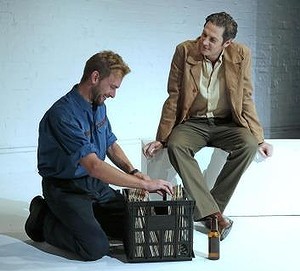Review: Playing Rock Hudson, Old Fitzroy Theatre
Last week, it was revealed that in the weeks before Hollywood heartthrob Rock

udson died, he reached out to Nancy Reagan (the then-First Lady of the United States) for help in receiving treatment.
Hudson had AIDS in a time when AIDS was a plague that you couldn’t pay a straight person to care about (pretty much literally). For Hudson to be a public sufferer of the disease meant Hudson was gay, and even as recently as 1985, that was the worst thing for a public figure to be. In the thirty years that have passed, things have changed a little. Overwhelmingly in Hudson’s home country, the United States, state laws preventing equal marriage are being overturned. AIDS deaths have dropped through years of education, preventive methods, and straight-up fear. However, the numbers are starting to creep up again in young gay kids, perhaps now too removed from the terror of the ‘plague’ to feel its true consequence. Perhaps because many don’t remember Rock Hudson.
Playing Rock Hudson is a courtroom drama that plays with the idea of the truth, following the relationship between Hudson and his lover Marc Christian, who sued for damages after Hudson’s death, alleging that he was never told about Hudson’s status. The play wants us to consider both sides of the case being argued; in one version of a scene, Christian is tender and loving and devoted to Hudson. When the scene is replayed later, he’s much more dismissive, much more in control.
There are some urgent themes hinted in the play, ones of consent and sexuality and the culture of fear and uncertainty and emotional warping that came from the discrimination running rampant in the mid-80s, that comes from closets, that comes from age differences in relationships and fame and all kinds of things. They are there in the script and the concept behind the piece, but they don’t really emerge and aren’t really explored. The show feels like transcripts and only transcripts, too stilted at times, and narratively weak, which is a shame when the story and facts are so strong. Hudson is so enigmatic in this show that we never know his truth (probably because it wasn’t part of the court case, only everyone else’s version of it) but in the play there’s room to present him as something, someone, of dramatic note, and it might have helped us to engage with it a little more.
Paul Dowson plays Hudson with a pleasant stoicism and inherent goodness; he’s childlike and loving and either naive or gullible depending on the moment, but the play is aching for more time with him. Christian (Mark Taylor) is too enigmatic for his own good and it makes it hard for the audience to choose a side; is he a villain or not? Grace Victoria’s Elizabeth Taylor manages to carry herself, somewhere between a strong brow and with the set of her shoulders, as an imposing diva with a heart of gold; she’s charming with Hudson and their scenes together are a welcome respite from the whole of the piece, which is, in moments, wretchedly boring.
The ensemble of actors are solid and the piece is clearly a passion project – the show was almost doomed when its intended home, the Tap Gallery, closed unexpectedly, managing to secure a second home at the Old Fitz when all seemed lost – but it needs more dramaturgical work before it can really connect. It needs to bring the story to the forefront, find its core, and bring it forth.



